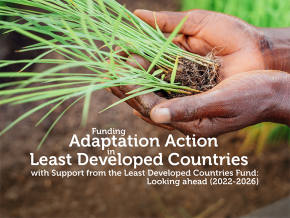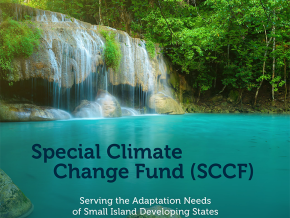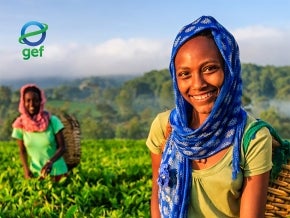
With heavenly beaches, an active volcano with an impressive crater, and the ever-present scents of ylang-ylang, vanilla and clove, the Comoros is an island archipelago located in the Indian Ocean between Africa and Madagascar, known as the “Perfume Islands.”
This is paradise. But climate change is threatening lives and livelihoods, upending traditional agricultural practices, and putting paradise at risk.
This small island developing state is one of the smallest and poorest countries in Africa. Agriculture remains an integral part of Comorian life, with more than 30 percent of the labour force finding their livelihoods on the farm.

Around 200,000 Comorians rely solely on agriculture to make a living and the vast majority have no training in this area. At a time when traditional knowledge is disappearing, farmers need more than ever to be mentored, and receive new information and tools to adapt to a changing climate. A lack of modernization has also created profitability problems for many farmers, perpetuating hard-to-break poverty traps, and limiting the country’s ability to reach goals for poverty reduction, food security and other targets outlined in the 2030 Agenda for Sustainable Development.
As the climate changes – with prolonged droughts, heavy rains in January through March, increasing risks from pests and other plant diseases, high winds, floods, stronger cyclones, and sea-level rise that threatens important public infrastructure - Comoros must adapt.
One way the Government of Comoros is supporting its people to adapt is through a project to “Strengthen the Adaptive Capacity and Resilience to Climate Change in the Agriculture Sector (CRCCA).” Financed through the Global Environment Facility Least Developed Countries Fund (GEF-LDCF) and supported by the United Nations Development Programme (UNDP), the project works to ensure that farmers in Comoros have the capacity, tools and technologies they need to reduce the vulnerability of agricultural systems to climate change and variability.
Started in 2014, the project has supported nearly 200 farming communities that are highly vulnerable to climate change across the territory.

IN THE BEGINNING, THERE WERE FARMER-TRAINERS
The CRCCA project relies on "farmer-trainers" who are responsible for spreading and explaining agricultural techniques and technologies shared through Comoros’ Rural Centers for Economic Development (RCED). These men and women were specifically chosen through the project because of their unique motivation and learning abilities, and capacity to share complex concepts, innovate and professionalize farming practices. In the end, they are fast becoming role models within their communities.
In all 25 farmer-trainers were given advanced training on composting, soil restoration, market gardening, banana and potato farming, and cattle and goat rearing. To reach outlying communities, the project worked to include a large geographic area, including 11 trainers in Ngazidja (7 in Dibwani and in 4 Sidjou), 8 in Anjouan (4 in Pomoni and 4 in Mrémani) and 6 in Mohéli (3 in Fomboni and 3 in Djando)
The farmer-trainers work closely with technicians from the RCEDs and the project team, who support and advise them on how to make their farms more efficient, productive and sustainable. Working through the communities, this farmer-trainer approach, allows for the effective replication and scaling up of climate-resilient farming practices across the communities.
"Today, my farm has become a field school and nearly a 50 people come every day to learn new farming techniques," says Farmer-Trainer Wirdane Amboudi.
They are also responsible for demonstrating efficient practices and explaining what they have learned to their own communities using their own experiences. With increased capacity, and strong local ownership, the farmer-trainers are themselves a guarantee to the sustainability of the project’s activities.
Fatima, a farmer from Diboini, received specialized training on composting and hedging, resulting in improved yields from her potato, yam and banana plants.
"In the old days, we did not know the true meaning of agriculture," said Fatima.

CLIMATE-RESILIENT SEEDS, FOR A CLIMATE-RESILIENT FUTURE
Over the course of the project, the training has accelerated, improving the diffusion of resilient technologies, adaptive techniques and climate-resilient seeds.
The climate-resilient seeds protect crops and improve productivity on the farm by reducing a number of plant ailments – such as cassava mosaic disease and the Cercospora fungi – that have gotten worse with Comoros’ climate changing.
To meet the demand for climate-resilient seeds, the project is working with all six Rural Centers and area nurseries to improve distribution and dissemination of the seeds. This has created a strong impact on local communities, farm productivity, and is changing the ways farmers do business.

A SHIFT ON THE RANCH
To enhance livestock productivity and protect ranchers from the threats that changing rainfall patterns, lack of water and temperature increases bring, the project led an operation to introduce Boer goats and three improved cattle breeds (Maillot, Nguni and Frison Holstein) from approved farms in South Africa in 2017.
With the chance for replication and scaling-up, 12 pilot farmers started the climate-resilient livestock initiative. With training, new barns, improved techniques and advanced technologies, the farmers were able to produce 100 liters of milk per day. At the same time, they created 10 tons of compost, which was used to fertilize a 1.3 hectare piece of farmland. More importantly, with improved quality, the price of milk went up from 850 francs per liter to 1250.
Taken from a 50,000-foot perspective, the demonstration operation will increase livestock production and productivity, revitalize milk and meat supply chains, and work to meet the ever-increasing demand in the Comoros for meat, reduce imports, improve the overall genetic quality of local herds, and most importantly improve farmers' incomes.

WATER! WATER IS LIFE!
Despite the Comoros archipelago being located in a generally well-watered climate zone with average rainfall exceeding 1500 mm per year, rainfall patterns have been changing. This means that there are higher-intensity rains in the rainy season and a prolonged dry season. This makes it hard for farmers to rely on traditional knowledge, and improved water-storage, use and management tools and techniques will be critical for farmers in the region.
The project carried out a number of climate actions around water, improving storage facilities as well as access to drinking troughs for livestock.
METEOROLOGICAL DATA FOR FARMERS
The project helped the National Agency of Civil Aviation and Meteorology (NACAM) strengthen its national meteorological service with the aim of setting up a simple agrometeorological system that could provide information to institutions and farmers to enable them to better adapt their practices to climate change.
Thanks to this support, the NACAM now has an agro-weather service, trained staff (with advanced training on knowledge management, agro-meteorological principles, and drafting of farming bulletins). A network of automatic agro-meteorological stations and satellite-connected weather forecasting system has improved the collection and analysis of real-time meteorological data.
THE JOB OF THE FUTURE
With improved access to water, new climate-smart technologies and planting techniques, and the valuable information they need to thrive, enterprising farmers like Wirdane and Fatima are finding new confidence in the future.
"I call all young people like me to come and do this job because it's the job of the future," said Wirdane.

Footnotes: Story by Rehema Ahmed Abdallah, with Laurence LESSIRE and Greg Benchwick. Photos: UNDP Comoros.
Story originally posted by Climate Adaptation UNDP.


